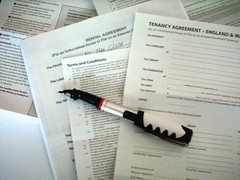A Comprehensive Rental Agreement: It’s the Lease We Can Do
Well, OK, it’s the MOST we can do, but we couldn’t let the pun pass us by. #NoApologies
 The Royal Rose Properties lease is 21 pages long. 13 of those pages are the actual lease agreement itself; the other 8 are supplementary forms and checklists — oh, and the pet policy is a separate 2-page document for those occasions when it’s needed. The lease agreement itself contains 70 established clauses and one blank clause to be used when a tenant needs special treatment. If you think that’s a lot of text to expect an applicant to read and understand, you’re right — it is. Despite our standard business practice of sending applicants a sample copy when they put money down to hold a home, many of them don’t bother to read our lease. But the lease agreement, although they sign and agree to it, isn’t for them –it’s for us.
The Royal Rose Properties lease is 21 pages long. 13 of those pages are the actual lease agreement itself; the other 8 are supplementary forms and checklists — oh, and the pet policy is a separate 2-page document for those occasions when it’s needed. The lease agreement itself contains 70 established clauses and one blank clause to be used when a tenant needs special treatment. If you think that’s a lot of text to expect an applicant to read and understand, you’re right — it is. Despite our standard business practice of sending applicants a sample copy when they put money down to hold a home, many of them don’t bother to read our lease. But the lease agreement, although they sign and agree to it, isn’t for them –it’s for us.
Educating the Tenants
In an ideal world where every tenant was as aware, prompt, and responsible as our best tenants, we still wouldn’t take a single word out of our lease. The reasons why are simple: first, bad luck happens, even to good people. But far more importantly, real life is ridiculously complicated, and there’s no reasonable way that anyone — even the most responsible, most aware person — can be expected to know all of their obligations as a tenant. By putting all of those obligations and restrictions in the lease (and making them sign off on them), we are doing everything we can to make sure that they have access to all the information they need.
For example: we increase a tenant’s rent by 10% if we discover that someone is receiving mail at one of our homes without being on the lease. There are a few reasons for it, not the least of which is the (good) chance that the recipient is actually living in the unit and isn’t listed on the lease. That’s not a restriction your typical person off the street would consider if, for example, a relative of the tenant asked them to allow the use of the rental property address as their primary residence to get better car insurance rates or so their kids could go to a different school district. So, it has to go in the lease, spelled out.
Responsibilities and Rights
Of course, the bulk of the lease is about laying out exactly what our tenants are responsible for, vs. what we cover. These are the dozens of clauses telling applicants that no, we don’t cover pest control unless the pests were there when you moved in, and yes, if we don’t like the color or quality of any painting you did, we will charge your security deposit to put it back the way it was when you moved in.
The BIG one of these — the clause that informs tenants that they have a responsibility to perform basic maintenance on the house, like changing light bulbs and furnace filters, maintaining the yard and fixing anything they break. It specifically points out that “Tenants…are renting a home, not a hotel room.” It’s appalling that we have to make that point, but it’s important enough that this clause, out of everything in our lease, is one of just two sections that we’ve highlighted in yellow to draw maximum attention to it. (The other is a comprehensive list of payment options we offer.)
The other side of the coin is that our lease reminds our tenants of certain important rights that they might otherwise be unaware of. Generally, these rights are relatively obscure ones, but are extremely important to the tenants when they do come into play. For example, our lease informs tenants of the laws that might allow them to break a lease early without penalty if they discover that the lease is ‘trapping’ them in a domestic abuse situation.
The Why Behind It All
So why is this subject so important that we’re spending an entire blog post writing about it? Simple — because we see so many other landlords, especially DIY landlords and new landlords, making the mistake of having a poorly-fleshed-out lease. We look at it this way: every single one of those 70 clauses in our lease protects us (meaning our company, but also including our clients who own the property in the first place) from some form of fiscal disaster. Without it, we would be vulnerable, and we would be making our clients vulnerable.
We don’t want our clients to be vulnerable; owning and renting out property is chancy enough without adding unnecessary layers of risk by having poorly-written contracts. So we strive to create the most ironclad lease we can, and we add to it every time we encounter a new situation that reveals some new way that we can protect our clients. In our eyes, it’s the least we can do.